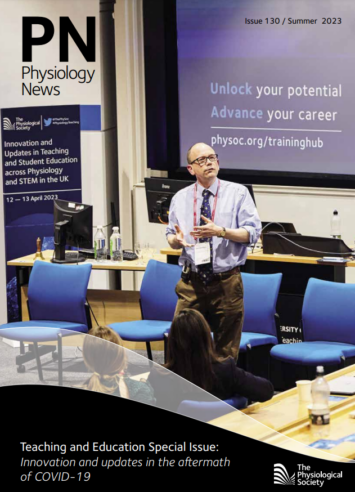
Physiology News Magazine
Meeting Report: Innovation and Updates in Teaching and Student Education across Physiology and STEM in the UK
12-13 April, University of Leeds, UK
Events
Meeting Report: Innovation and Updates in Teaching and Student Education across Physiology and STEM in the UK
12-13 April, University of Leeds, UK
Events
https://doi.org/10.36866/pn.130.40
Dr Alex Holmes
University of Leeds, UK
Dr Sarah Calaghan
University of Leeds, UK
Professional Development
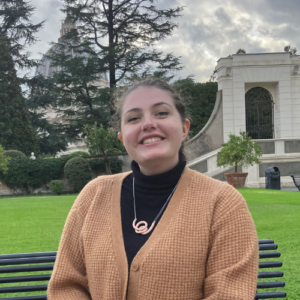
Dr Alex Holmes
University of Leeds, UK
I’m very new to the role of Teaching Fellow in Physiology, having only started the post in December 2022. So, as you can imagine, a two-day conference focusing on physiology pedagogy was an exciting but also daunting prospect! Despite that, the moment I turned up on the first day (or perhaps the second moment, a coffee was needed first), I was surrounded by friendly faces. Previously, I’ve only ever gone to more research-focused conferences, where teaching has felt like an afterthought, or wider education conferences, where it can be harder to find the physiological niche to discuss topics that are more centred to my role and interests. Whereas here, nearly every presentation, conversation or question felt tailored to me and the areas I wanted to explore as an educator.
The main thing I wanted to know, as someone who is incredibly early career and just starting to make my way in bioscience education, was how career progression worked and how I could set myself up to be successful from the earliest opportunity. I found that, as well as titbits I picked up over coffee, the conference had entirely foreseen and provided for my need through the Training Hub sessions.
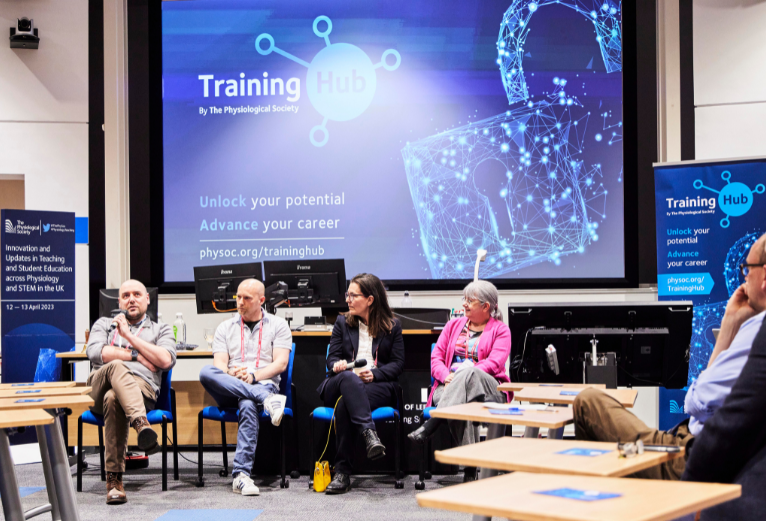
The first session was a four-member panel from newly appointed to a permanent position, through to promoted to professorship based on teaching and scholarship. This was a brilliant opportunity to hear from people about their paths to where they are now and collect their advice. I must admit I have several scrawled pages of notes thanks to this session. I loved the mix of celebration of achievement and joy in accomplishments, tempered with frank and honest advice. Although I’m likely a little while off some of the career steps being discussed (although I wouldn’t say no to a professorial position if anyone’s offering), the advice from all levels felt very applicable and has given me a much clearer idea of how to identify the areas and activities I can be involved in now that will help my progression in the future.
The second two-day session gave me another look at career progression, through the lens of demonstrating the impact of scholarship work. Here I gained some great ideas around how to group and structure examples of impact, and how to strategically do scholarship work while maintaining other responsibilities, by “make[ing] your academic role the basis of your scholarship” (Sarah Hall). Although I’m already used to quantitative measures of impact, getting more examples and insight into qualitative evidence was very valuable. These two sessions have left me with a rather sizeable wish-list of things to get involved in and do, but I’ve already signed up for more Training Hub sessions to get even more of this kind of content.
Overall, these were incredibly valuable days spent with brilliant people. I’m grateful that the Biological Sciences Teaching Innovation Hub supported me to attend and to Charlotte Haigh, Chris Randall, Ruth Norman and The Physiological Society for organising.
Assessment Matters
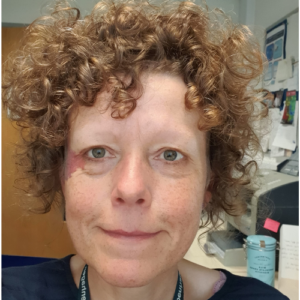
Dr Sarah Calaghan
University of Leeds, UK
I attended The Physiological Society meeting in Leeds with my Assessment Lead and Academic Integrity Officer hat firmly in place. However, I came away thoroughly inspired by so many other aspects of teaching and student education that my hat had slipped somewhat by the end of the second day! The breadth of experience and approaches from the many presenters was impressive, and the balance of longer talks and five-minute flash talks ensured that the audience was always engaged.
Here I will pull out some valuable insights into assessment matters from the mix.
There are many issues affecting assessment at present. One of these is ensuring that we meet the needs of a diverse student population. This issue was addressed by Nicholas Freestone from Kingston University, where students from ethnic minorities and with high measures of deprivation form the majority of the cohort. Detailed breakdown of coursework and exam grades against ethnicity reveals anomalies in performance, raising the question: How can we cater for different groups when we assess? Dr Freestone’s view – that we probably cannot entirely manage this– is pragmatic, but was balanced by some interesting ideas of engaging students with work from scientists of their own ethnicity in preparing literature reviews or Capstone reports.
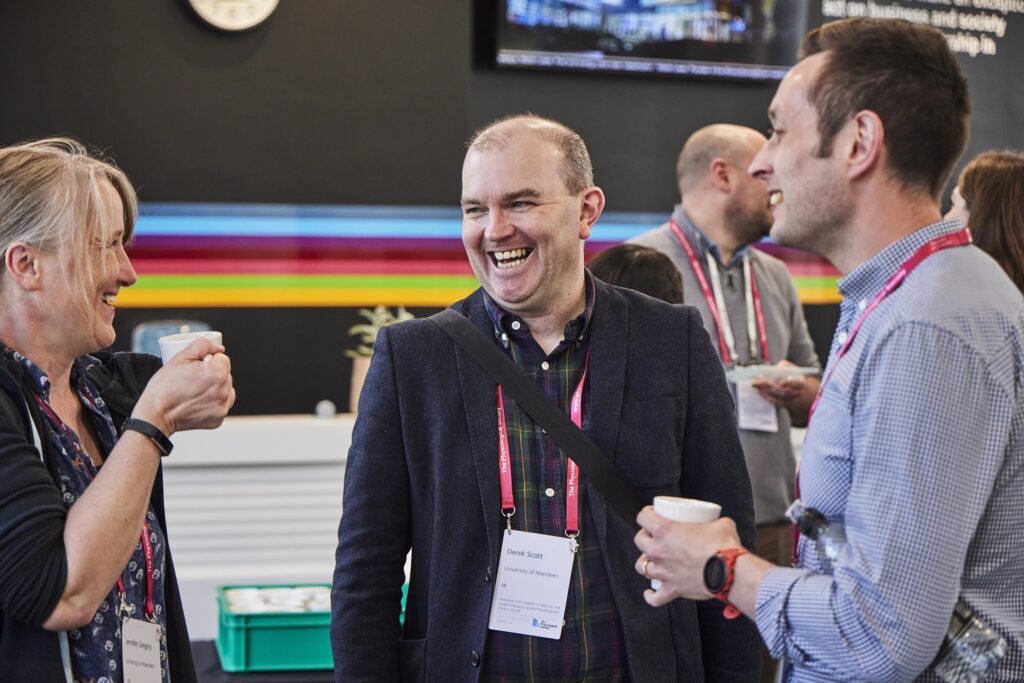
One particularly pressing issue regarding assessment is the advent of AI tools such as ChatGPT, which has stirred panic throughout the community. The initial knee-jerk reaction (go back to in-person exams) is being replaced by a more realistic view of the possible advantages of this technology. Dawn Davies (Bristol) encouraged us to exploit AI tools. She proposed using ChatGPT generated text as a basis for assessment of students’ ability to critically evaluate (sense, accuracy, and support from the literature). An assessment such as this teaches students skills, but it also confers the notable advantage of highlighting the limitations of AI tools. Another positive outcome of the advent of AI tools is that it provides a stimulus for designing more authentic assessment, as highlighted by Harley Stevenson-Cocks (Newcastle).
The drive for more authentic assessment has been around for a while, even before the emergence of sophisticated AI tools. Clare Tweedy (Leeds) described a problem-based learning approach used in a large cohort (220 students) Neurobiology module. A problem (clinical case study) was used to drive, rather than test, learning in small, facilitated study groups timetabled over a four-week period. This approach was highly rated by the class. Dave Lewis (Leeds) showcased authentic assessment in the breadth of student Capstone projects offered, giving students responsibility for choosing a project that feeds directly into their planned career choice (whilst the shorter focused output also reduces the assessment load for staff – what is not to like?).
“Synoptic assessment” is another aspiration for many institutions- to encourage students to integrate information taught on different modules and to promote deep learning, whilst reducing over-assessment. Derek Scott (Aberdeen) gave a pragmatic introduction to inclusion of physiology “Core Concepts” in curriculum design, including assessment. He highlighted a paper published this year by Crowther and Knight (doi: 10.1152/advan.00024.2022), which proposes the use of conceptual framework-linked test question templates that essentially could be used to synoptically assess students’ understanding of a concept that is relevant to multiple areas of physiology (i.e. cross-modular).
It is difficult to talk about assessment without mentioning feedback, and there was plenty of stimulating discussion around this. Damian Parry (Newcastle) addressed a fundamental issue of the discrepancy between student and staff perception of feedback. He gave some practical guidance regarding resetting new students’ expectation of feedback (with regard to how this differs from feedback at school), including simple changes to nomenclature, the need to be explicit about what feedback is. Dr Parry also put forward the view that feedback (and feedforward) can be used to build an academic community and better relationships with students, particularly if this is verbal and/or students know who marked their work.
This idea of using feedback to build a sense of community was exemplified by a flash talk given by Ai Na Ng (Bristol) who described a feedback café experience. Here students were given the opportunity to meet with the teaching team in a social space with a view to discussing a piece of marked work, which helped students engage and understand feedback.
So lots of food for thought and practical guidance that we can easily apply; two days very well spent!
